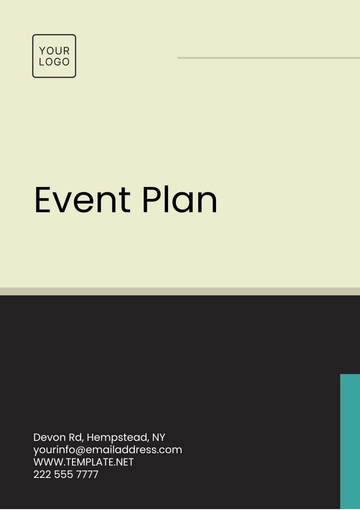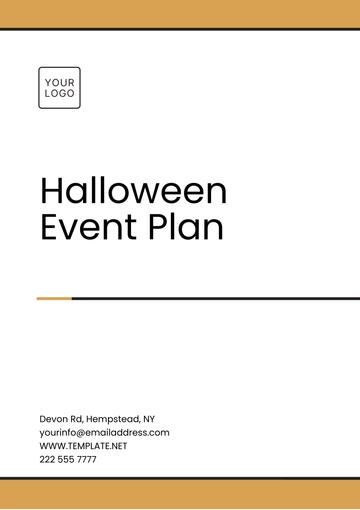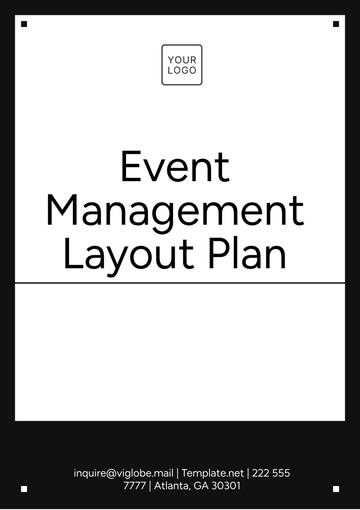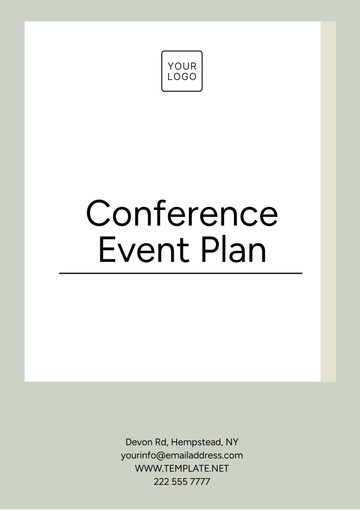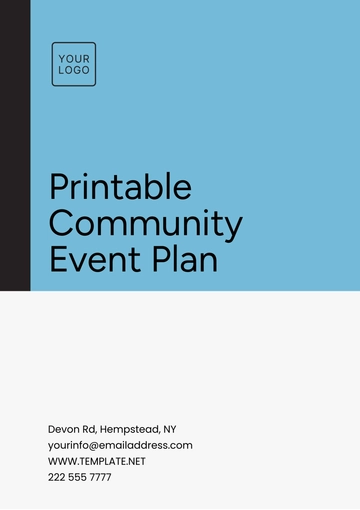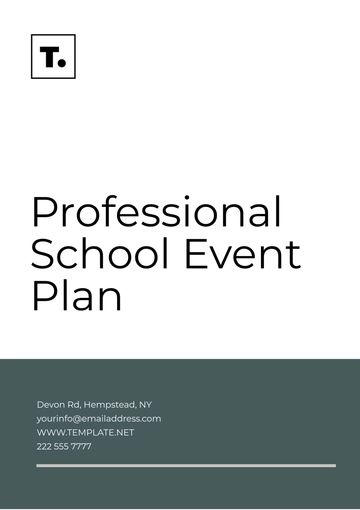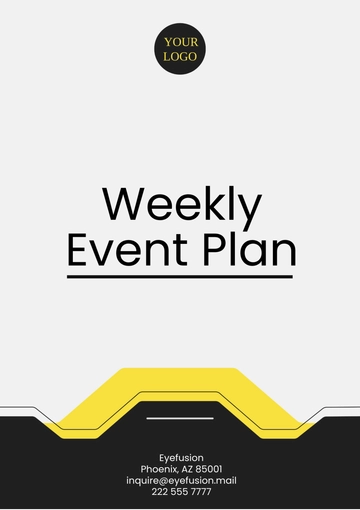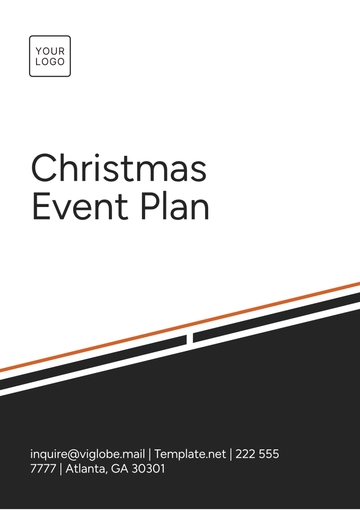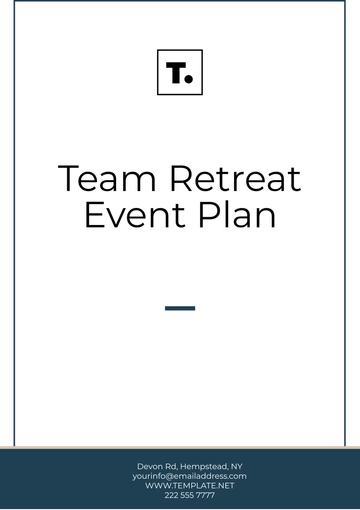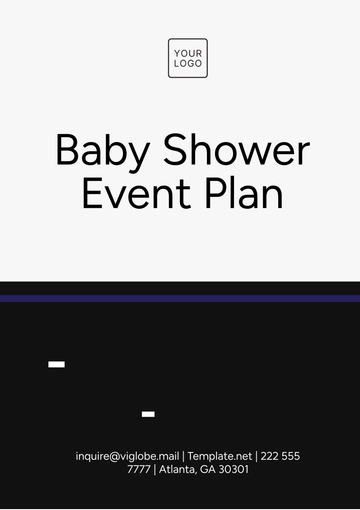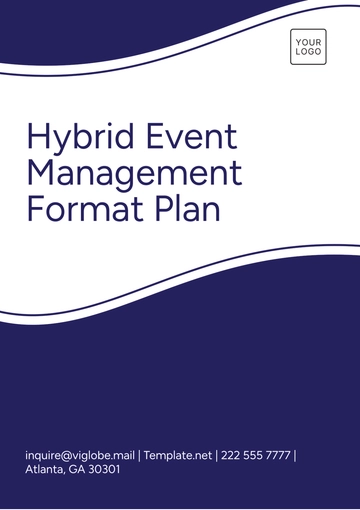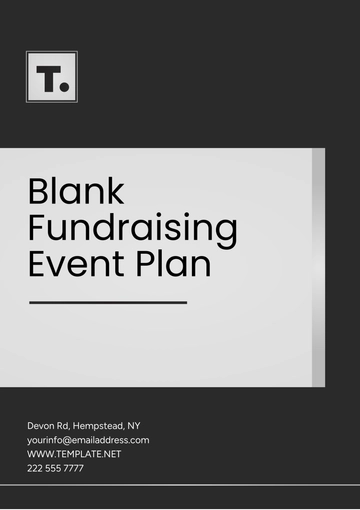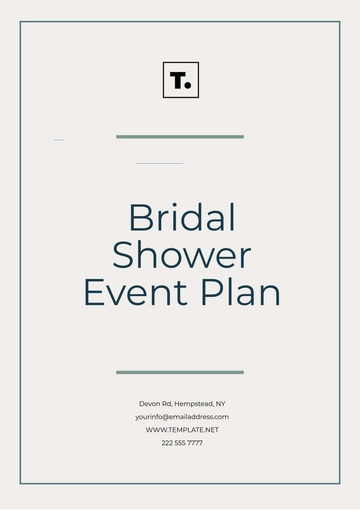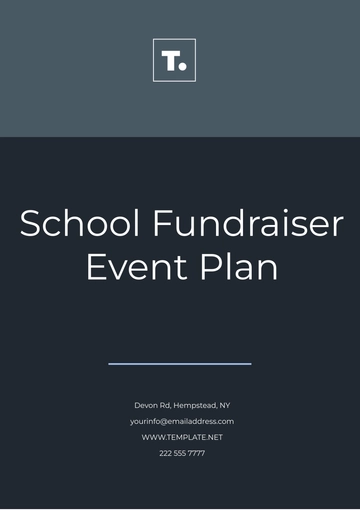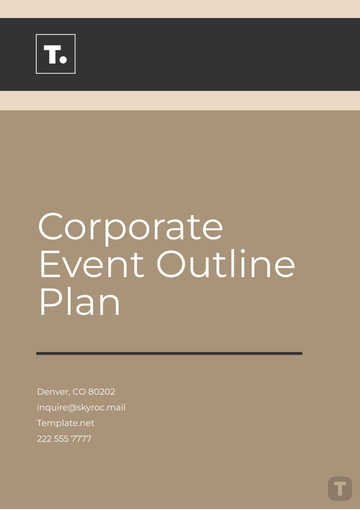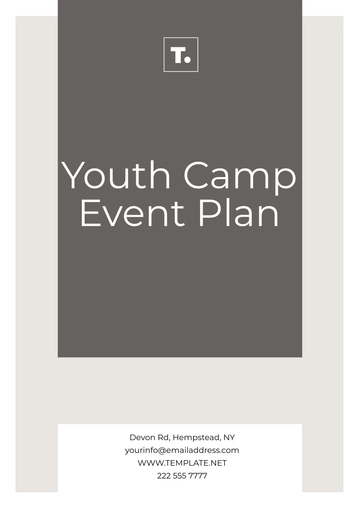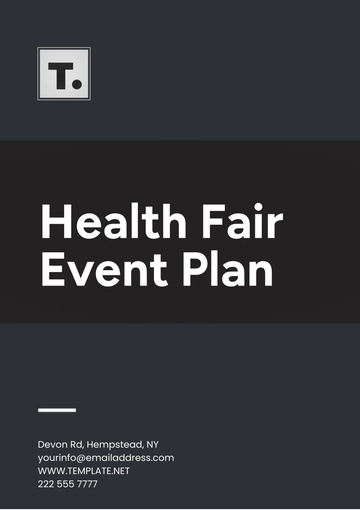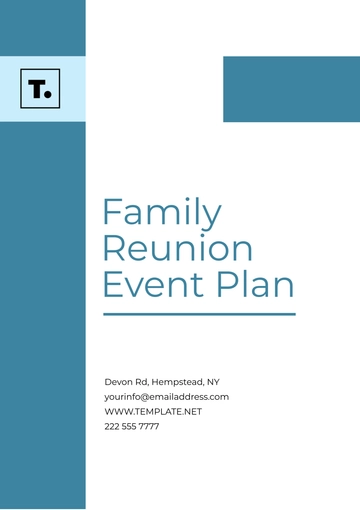Free Health Fair Event Plan
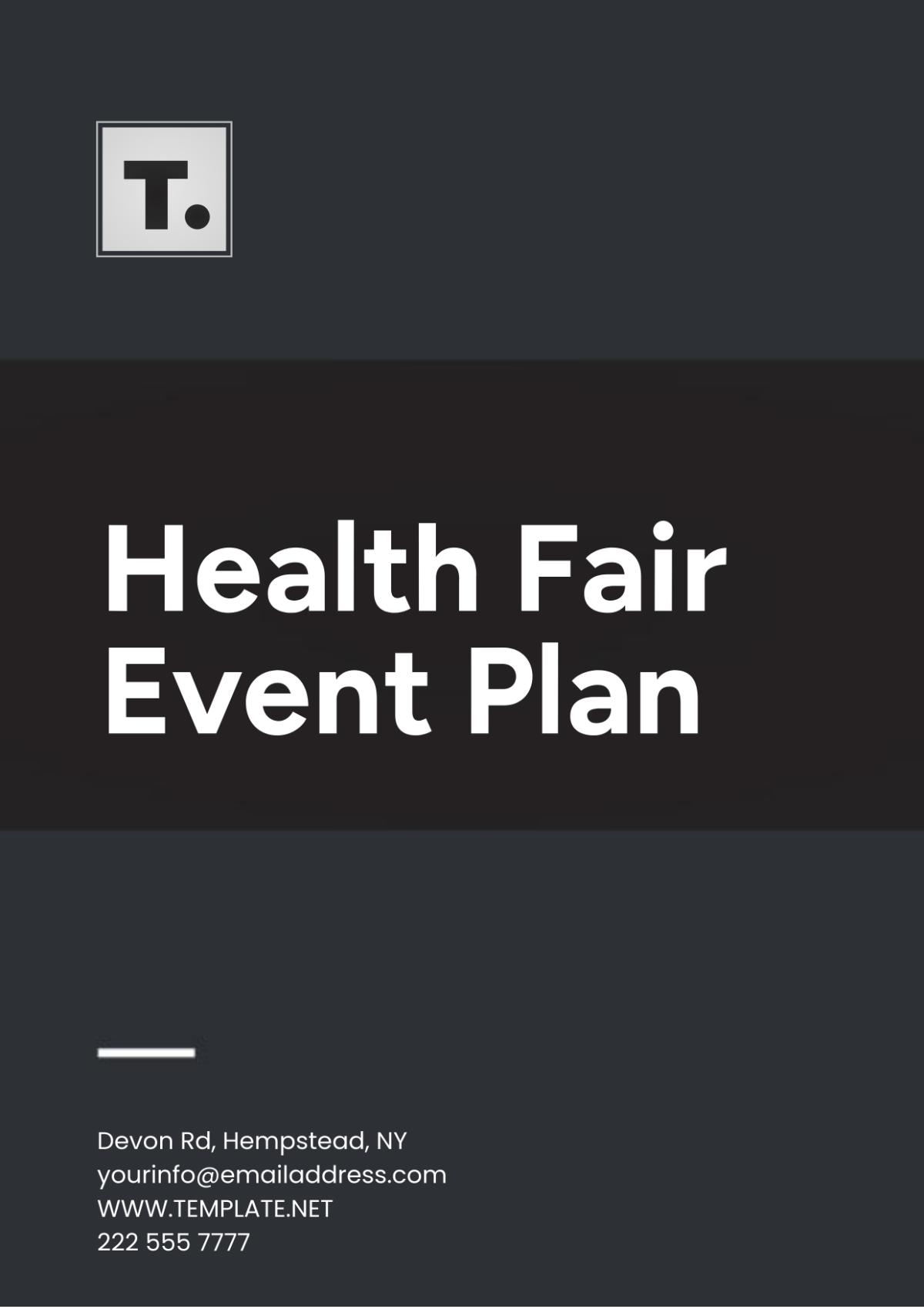
I. Introduction
The Health Fair Event aims to enhance health awareness within the community by offering free health screenings, educational workshops, and interactive activities. This plan outlines the essential steps required to successfully organize and execute the event, ensuring a positive impact on community health and wellness.
II. Planning and Logistics
Event Details
Date: Saturday, April 20, 2050
Time: 9:00 AM - 5:00 PM
Location: Community Recreation Center, 123 Health St, Your City
Budgeting
Expense Category | Estimated Cost |
|---|---|
Venue Rental | $500 |
Marketing and Promotion | $300 |
Equipment and Supplies | $400 |
Staffing | $200 |
Refreshments | $250 |
Miscellaneous | $150 |
Total | $1,800 |
Sponsors and Partnerships
Potential Sponsors:
Local Health Clinic (HealthFirst Clinic)
Fitness Center (FitLife Gym)
Grocery Store (Fresh Market)
Pharmaceutical Company (HealthPlus)
Partnerships:
Engage local healthcare providers to participate in screenings and workshops.
Collaborate with community organizations like the YMCA and local schools for volunteer support.
III. Program and Activities
Health Screenings
Blood Pressure Monitoring: Assess cardiovascular health.
Cholesterol Checks: Screen for heart disease risk factors.
Blood Sugar Testing: Identify diabetes risk.
Educational Workshops
Nutrition and Diet: Discuss healthy eating habits and meal planning.
Exercise and Physical Activity: Highlight the importance of physical fitness.
Mental Health Awareness: Provide resources and strategies for mental well-being.
Demonstrations and Interactive Activities
Yoga and Meditation Sessions: Promote relaxation and mindfulness.
First Aid Demonstrations: Teach basic first aid skills.
Cooking Classes: Offer hands-on cooking demonstrations for healthy meal preparation.
IV. Marketing and Promotion
Target Audience
Families, elderly individuals, young adults, and anyone interested in improving their health and wellness.
Advertising Channels
Social Media: Create event pages and use targeted ads to reach specific demographics.
Local Newspapers: Place announcements and articles highlighting event details.
Community Bulletin Boards: Post flyers and engage with local community centers, libraries, and schools.
Promotional Strategies
Collaborate with local influencers to spread the word.
Use email marketing to reach existing community members.
Offer incentives, such as raffle prizes, to encourage attendance.
V. Operations and Management
Volunteer Recruitment
Recruit volunteers from local schools, universities, and community organizations.
Provide training sessions covering roles and responsibilities, including registration, event guidance, and support staff duties.
Event Setup and Layout
Plan the layout to include designated areas for health screenings, workshops, and interactive activities.
Ensure there is ample seating, accessibility for individuals with disabilities, and clear signage for navigation.
Day-of-Event Schedule
8:00 AM: Volunteer Briefing – Overview of roles and responsibilities.
9:00 AM: Event Opens to the Public – Welcome and registration.
11:00 AM: Workshop: Nutrition and Diet – Interactive discussion and Q&A.
1:00 PM: Yoga Session – Guided session for relaxation and mindfulness.
3:00 PM: Final Health Screenings – Last chance for attendees to participate.
5:00 PM: Event Closure – Thank attendees and volunteers, share resources for further health education.
VI. Evaluation and Feedback
Participant Feedback
Distribute surveys to attendees to gather feedback on various aspects, including event content, organization, and personal impact.
Encourage open-ended comments to gather qualitative insights.
Post-Event Review
Conduct a debriefing meeting with organizers and volunteers to assess the event's success and discuss areas for improvement.
Compile a report summarizing feedback, attendance figures, and recommendations for future health fairs.
Follow-Up
Share highlights and outcomes of the event with attendees via email or social media.
Offer resources and information on how to maintain healthy habits learned during the event.
- 100% Customizable, free editor
- Access 1 Million+ Templates, photo’s & graphics
- Download or share as a template
- Click and replace photos, graphics, text, backgrounds
- Resize, crop, AI write & more
- Access advanced editor
Organize your next health fair seamlessly with the Health Fair Event Plan Template from Template.net. This editable and customizable template allows you to tailor every aspect to your needs. Effortlessly modify details using our AI Editor Tool, ensuring a smooth planning process. Make your health fair a success with this user-friendly resource today!
You may also like
- Finance Plan
- Construction Plan
- Sales Plan
- Development Plan
- Career Plan
- Budget Plan
- HR Plan
- Education Plan
- Transition Plan
- Work Plan
- Training Plan
- Communication Plan
- Operation Plan
- Health And Safety Plan
- Strategy Plan
- Professional Development Plan
- Advertising Plan
- Risk Management Plan
- Restaurant Plan
- School Plan
- Nursing Home Patient Care Plan
- Nursing Care Plan
- Plan Event
- Startup Plan
- Social Media Plan
- Staffing Plan
- Annual Plan
- Content Plan
- Payment Plan
- Implementation Plan
- Hotel Plan
- Workout Plan
- Accounting Plan
- Campaign Plan
- Essay Plan
- 30 60 90 Day Plan
- Research Plan
- Recruitment Plan
- 90 Day Plan
- Quarterly Plan
- Emergency Plan
- 5 Year Plan
- Gym Plan
- Personal Plan
- IT and Software Plan
- Treatment Plan
- Real Estate Plan
- Law Firm Plan
- Healthcare Plan
- Improvement Plan
- Media Plan
- 5 Year Business Plan
- Learning Plan
- Marketing Campaign Plan
- Travel Agency Plan
- Cleaning Services Plan
- Interior Design Plan
- Performance Plan
- PR Plan
- Birth Plan
- Life Plan
- SEO Plan
- Disaster Recovery Plan
- Continuity Plan
- Launch Plan
- Legal Plan
- Behavior Plan
- Performance Improvement Plan
- Salon Plan
- Security Plan
- Security Management Plan
- Employee Development Plan
- Quality Plan
- Service Improvement Plan
- Growth Plan
- Incident Response Plan
- Basketball Plan
- Emergency Action Plan
- Product Launch Plan
- Spa Plan
- Employee Training Plan
- Data Analysis Plan
- Employee Action Plan
- Territory Plan
- Audit Plan
- Classroom Plan
- Activity Plan
- Parenting Plan
- Care Plan
- Project Execution Plan
- Exercise Plan
- Internship Plan
- Software Development Plan
- Continuous Improvement Plan
- Leave Plan
- 90 Day Sales Plan
- Advertising Agency Plan
- Employee Transition Plan
- Smart Action Plan
- Workplace Safety Plan
- Behavior Change Plan
- Contingency Plan
- Continuity of Operations Plan
- Health Plan
- Quality Control Plan
- Self Plan
- Sports Development Plan
- Change Management Plan
- Ecommerce Plan
- Personal Financial Plan
- Process Improvement Plan
- 30-60-90 Day Sales Plan
- Crisis Management Plan
- Engagement Plan
- Execution Plan
- Pandemic Plan
- Quality Assurance Plan
- Service Continuity Plan
- Agile Project Plan
- Fundraising Plan
- Job Transition Plan
- Asset Maintenance Plan
- Maintenance Plan
- Software Test Plan
- Staff Training and Development Plan
- 3 Year Plan
- Brand Activation Plan
- Release Plan
- Resource Plan
- Risk Mitigation Plan
- Teacher Plan
- 30 60 90 Day Plan for New Manager
- Food Safety Plan
- Food Truck Plan
- Hiring Plan
- Quality Management Plan
- Wellness Plan
- Behavior Intervention Plan
- Bonus Plan
- Investment Plan
- Maternity Leave Plan
- Pandemic Response Plan
- Succession Planning
- Coaching Plan
- Configuration Management Plan
- Remote Work Plan
- Self Care Plan
- Teaching Plan
- 100-Day Plan
- HACCP Plan
- Student Plan
- Sustainability Plan
- 30 60 90 Day Plan for Interview
- Access Plan
- Site Specific Safety Plan
